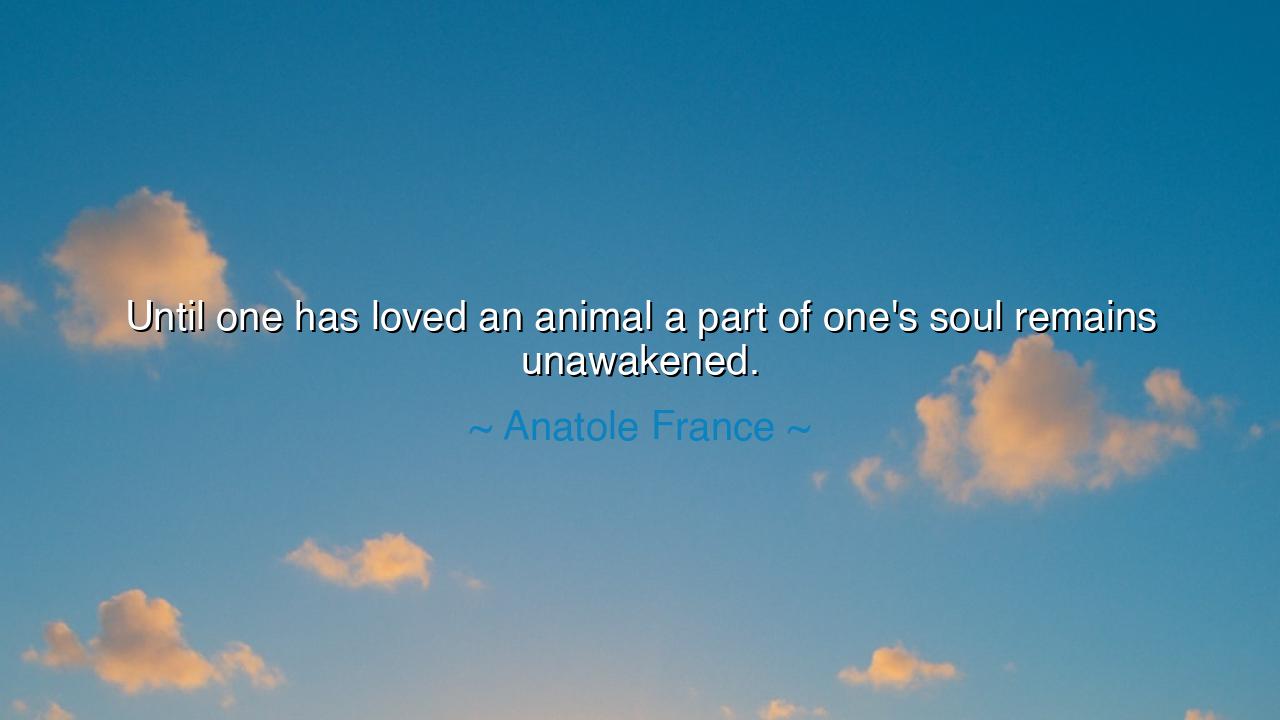
Until one has loved an animal a part of one's soul remains






The words of Anatole France, “Until one has loved an animal, a part of one’s soul remains unawakened,” rise like a gentle hymn, calling us to remembrance of what it means to be fully human. For the soul is vast, with many chambers, and not all of them are opened by human love alone. Some doors are hidden, waiting for the soft paw, the loyal gaze, or the beating wings of another creature to unseal them. In loving an animal, we touch a realm of innocence and purity that no human bond can quite mirror. It is a love stripped of pretense, of ambition, of the burdens that men and women so often place upon one another.
The origin of this quote is found in France’s lifelong reflections as a poet, critic, and philosopher. He lived in an age when animals were still largely seen as property, valued for labor or use rather than companionship. Yet France perceived more deeply, recognizing that the relationship between man and beast was not merely practical but profoundly spiritual. In this he aligned with the ancients, who in their myths and sacred rites often saw animals as messengers of the divine—Zeus in the eagle, Artemis with the stag, the Egyptians in their reverence for the cat. He understood that to love an animal is to awaken a part of the soul that has lain dormant since the dawn of creation.
Consider the story of Greyfriars Bobby, the faithful Skye Terrier of Edinburgh. When his master, John Gray, died in 1858, Bobby kept vigil at his grave for fourteen years, braving cold and hunger, refusing to leave his post until he too passed away. The people of Edinburgh built a statue to honor his loyalty, but the true monument was carved in the hearts of all who witnessed his devotion. To behold such steadfast love is to be stirred in the deepest places of the soul. Many who saw Bobby came to understand what Anatole France meant—that the love of an animal awakens within us a purity of devotion we might never have known otherwise.
This awakening is not mere sentiment. It is the revelation of kinship, that we are not alone in creation, but part of a greater family. The cat purring at our feet, the horse carrying us across the field, the bird that sings at dawn—these are not strangers but companions. Their love, freely given, reflects back to us our own capacity for tenderness. They draw forth patience, selflessness, and joy in the simplest of gestures. In caring for them, we are reminded that power is not meant for domination, but for stewardship.
The meaning of France’s words is also a rebuke to pride. For man often imagines himself the pinnacle of life, master of earth and sky. Yet in the quiet gaze of a dog or the gentle presence of a horse, we are humbled. We realize that wisdom is not measured in words, nor love in lofty declarations, but in the silent constancy of presence. Animals teach us that love does not demand grandeur; it dwells in nearness, in loyalty, in trust unbroken. When this truth dawns upon us, a veil lifts, and the soul is stirred to its fuller stature.
The lesson is this: Seek the love of animals, not only as comfort but as teacher. In their company, you will discover pieces of your heart you did not know were missing. The child who grows up with a dog learns compassion earlier. The elder who keeps a cat by his side finds companionship in solitude. The farmer who tends his horse with care learns patience and humility. These are not small awakenings; they are the foundations of a soul more complete.
Practical action is simple, yet profound. If you have no animal, seek to know them—volunteer at a shelter, walk among horses, feed the birds, or simply sit quietly in nature until the wild comes near. If you do share your life with an animal, love them deeply, honor their trust, and let them teach you the language of loyalty. For in every wagging tail, in every steady gaze, in every soft nuzzle, there lies an invitation to awaken the chamber of your soul that still sleeps.
Thus, in the wisdom of the ancients, we say: Blessed are those who love not only man but beast, for they walk in harmony with creation. Blessed are those who awaken their souls through such love, for they shall know a depth of tenderness the proud will never touch. And may we remember always the call of Anatole France: that without the love of animals, our souls remain only half-awake, but with it, we rise into wholeness.






AAdministratorAdministrator
Welcome, honored guests. Please leave a comment, we will respond soon